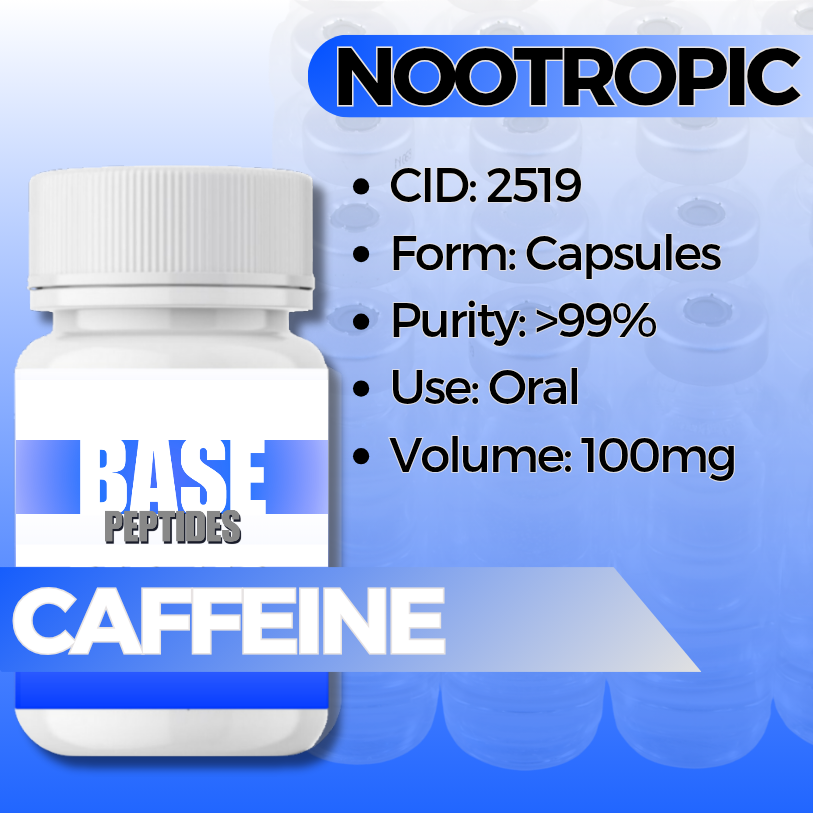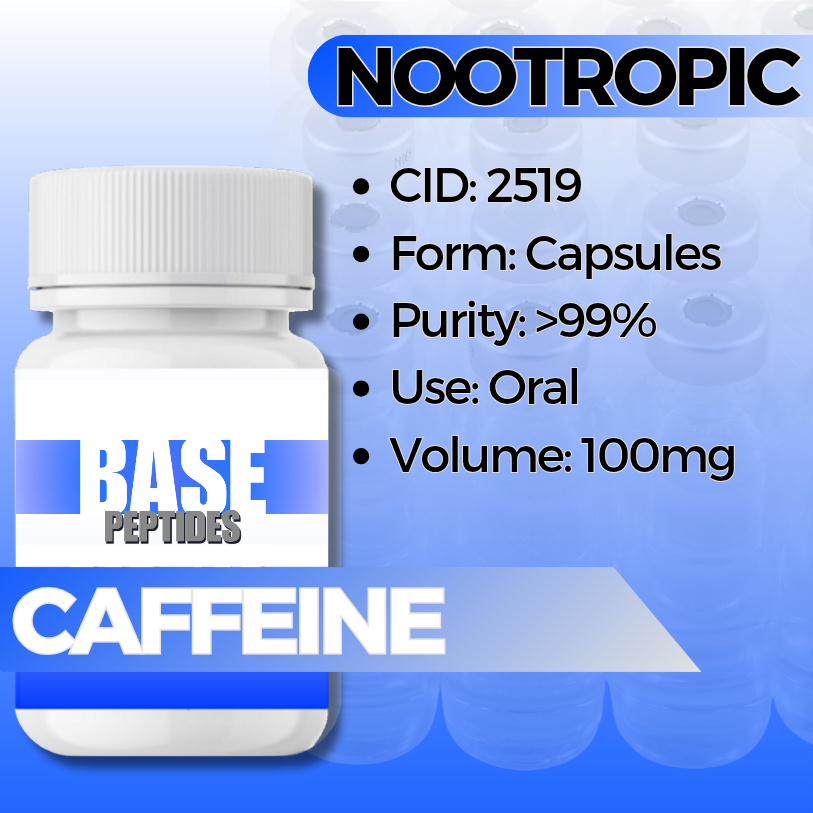Caffeine Capsules
Caffeine Capsules
Base Peptides are intended for licensed medical professionals and experienced researchers. Reconstitution required. Dosing and use instructions are not provided.
Couldn't load pickup availability
Caffeine (Anhydrous) — Purified Methylxanthine (Capsules)
Research-grade caffeine (anhydrous) is a purified methylxanthine widely used in studies of alertness, reaction time, endurance performance, and metabolic activation. It primarily acts as an adenosine receptor antagonist with secondary effects on catecholamines and intracellular signaling (e.g., cAMP).
- Synonyms: 1,3,7-Trimethylxanthine; Caffeine (anhydrous)
- CAS No.: 58-08-2
- Formula / MW: C8H10N4O2 • ~194.19 g·mol⁻¹
- Class: Methylxanthine stimulant; adenosine A1/A2A antagonist
- Blocks adenosine receptors → reduces sleep pressure and perceived fatigue; increases cortical alertness.
- Leads to higher neuronal firing and modest catecholamine release; downstream ↑ cAMP via phosphodiesterase effects at higher exposures.
- In exercise studies, may lower perceived exertion and enhance endurance output (context- and dose-dependent).
- To probe vigilance, reaction time, attention, and psychomotor performance.
- To assess endurance and strength-endurance in sport/exercise physiology models.
- To study metabolic rate, thermogenesis, and synergy with other actives (e.g., theanine).
Key Study Themes — What’s Typically Observed
Alertness, Reaction Time & Cognitive Throughput
- Endpoints: PVT/RT, sustained attention, working memory accuracy.
- Typical findings: Faster reaction times and improved vigilance, especially during sleep loss or circadian dips.
- Notes: Inter-individual response varies with habitual intake, genotype (e.g., CYP1A2), and time of day.
Exercise & Metabolic Outcomes
- Endpoints: Time-to-exhaustion, RPE, fat oxidation, HR/BP.
- Typical findings: Small-to-moderate improvements in endurance performance; modest increases in metabolic rate.
- Design tip: Standardize caffeine washout and dietary background (esp. habitual coffee use).
Potential Research Applications
Alertness & Shift-Work Models
- Night-shift vigilance, sleep-restriction paradigms, driving simulators.
Sports & Exercise Physiology
- Endurance time trials, RPE modulation, substrate utilization.
Metabolic & Thermogenic Studies
- Resting energy expenditure, catecholamine panels, cAMP pathways.
Synergistic / Comparator Compounds
L-Theanine
- Why pair: Classic combo—maintains alertness while smoothing perceived jitteriness.
NALT (N-Acetyl L-Tyrosine)
- Why pair: Catecholamine precursor for attention under stress; compare combined vs solo effects.
Alpha-GPC
- Why pair/compare: Cholinergic support for focus; contrasts dopaminergic/adenosine mechanisms.
Known Concerns (Context)
- Cardio/CNS effects: Can increase heart rate, blood pressure, and anxiety/jitter in sensitive subjects.
- Sleep disruption: Long half-life; avoid late testing if sleep metrics are endpoints.
- Tolerance & withdrawal: Habituation may blunt effects; sudden cessation can cause headaches/fatigue.
- General: For laboratory research use only; not for human consumption or therapeutic use.
What’s in the Capsule (Editable)
| Active | Per Capsule | Grade / Purity |
|---|---|---|
| Caffeine (Anhydrous) | 200 mg | Research-grade, ≥ 99% (HPLC/MS) |
| Excipients | Microcrystalline cellulose, magnesium stearate (or specify “None” if pure-fill) | |
| Allergens | No common allergens; non-GMO (update per lot) | |
Specifications & Handling
- Form: Encapsulated solid (lot-coded)
- Storage: Cool, dry; protect from heat and moisture
- Labeling: Research-use-only; tamper-evident; lot/SKU and expiry displayed
- QC: HPLC identity/purity, residual solvent analysis, microbial limits (per lot COA)
- Traceability: Batch number links to COA; keep out of reach of children
Regulatory & Use Notice
Sold for laboratory research use only. Not for human consumption, medical, or veterinary use. No human-use instructions are provided. Buyer is responsible for safe handling and regulatory compliance.
Caffeine Anhydrous Capsules | Research-Grade Methylxanthine | Alertness, Reaction Time & Endurance Studies


